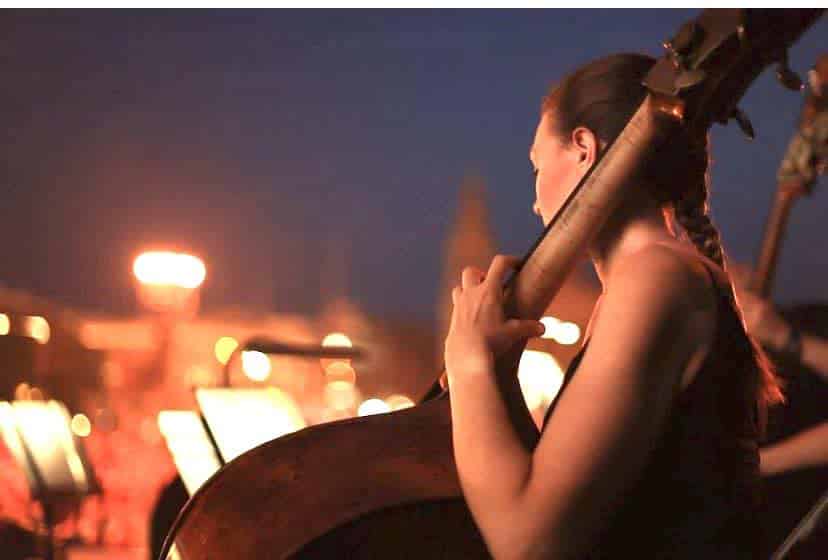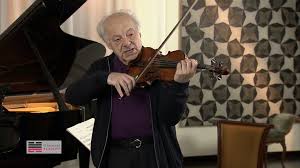Israeli player: Why I quit the Berlin Philharmonic
NewsThe bassoonist Mor Biron was appointed to the Berlin Philharmonic in 2007 and left this summer after the annual Waldbühne concert.
He explains why to VAN magazine’s Hartmut Welscher:
‘There’s a lot of masculine energy in the orchestra, which in turn is because there aren’t enough women in the orchestra. There aren’t enough feminine vibes in the individual sections. Recently, I went to a Philharmonic concert with my parents. For so many years, I watched and listened to the orchestra—onstage and off, in the concert hall and on the Digital Concert Hall. But this time, that lack of feminine energy hit me really hard. I saw this semicircle of men sitting there, and it didn’t matter what they did or how they played, all I saw was this male energy. I looked at my father and asked him, “Do you see it, too?”’

Read the full interview here.






Well, there are a lot more women than there used to be! It seems to depend on the program you attend. The recent concert with John Williams (on the Digital Concert Hall) had numerous female players involved.
Look at the winds and brass sections : almost 0 women.
Like most orchestras.
Most orchestras have a lot more women in the woodwind section. Even Vienna Philharmonic has more. If their excuse is that they only take the best, I can only conclude they have been running some very ineffective auditions, because as fine as their principal players are as soloists, I can name quite a few woodwind sections that I like better.
I suppose, but Sarah Willis seems to be the face of the brass section of Berlin and of the world of horn at large.
Though her blog which as become a promotional device for the Berlin Phil. She thus never mentions that she is the only woman in the brass section, and that the orchestra has the third lowest ratio of women in the world. Maybe she never noticed……….
Mor Biron funnily has the most infamous reputation among Berlin (if not nationalwide) musicians being the biggest pain in the ass. He quit Berlin Phil because he thinks he is better than his phil colleagues and only now he‘s realized he‘s done too many mistakes to fellow musicians in the past and trying to compensate with such article. Well, he will need a lot more of such to make up for his past behaviors.
“…now we’re gettin’ warm..” (High Society).
Imagine selling out his own gender… That takes some (lack of) balls.
If that’s your claim, you should known better than anybody else.
I hope Mor Biron will find his way, and be prosperous in the future.
Male energy? Is that even plausible? Urgh… he is a great bassonnist, and his contribution stops there.
Isn’t saying that there’s a difference between masculine energy and feminine energy sexist. He is essentially saying that men are different from women. Doesn’t this lead to the conclusion that society can treat women differently.
It absolutely is sexist.
Not if one defines gender-coding in music as a culturally defined construct instead of something biological. This leaves people and organizations room to define for themselves their own musical gender identity. Or to not have one at all.
There does not exist something like “gender-coding in music as a culturally defined construct”. It is paranoid projection in the heads of feminists who have taken Foucault seriously.
You should visit any major conservatory and see what the demographics are.
Now look at the demographics of orchestras, particularly the ages and consider for the 45+ age group of players what were the demographics in conservatories when these aged professionals were students.
You cannot look at an orchestra and calculate sexism simply by counting faces. There’s far more to it than your Neo-Marxist thought process will allow you to believe.
“musical gender identity”
pure nonsense, Mr Osborne
Well, men and women are different, in many ways. But not as in that they can’t cultivate all sides of the human spectrum of emotions.
Obviously physical and hormonal as well as neuronal differences exist. That’s scientific hard evidence. But it doesn’t matter much in music making. Maybe only the tuba and bass trombone are instruments, where the bigger male lung volume makes for a significant difference in fundamental ability. For all other instruments not so much.
I never thought men and women are different, apart from how they look and how they dress and their voices and stuff, and how they behave and how their rights are violated all the time like here. But for the rest it’s the same!
Sally
Well, Sally, you need to study the science more then. And let the evident differences not confuse you.
It always astounds me, how citing the scientific evidence gets a lot of dislikes in these post-factual nonsense times.
The first call free-lance bass trombonist in Tokyo is a small woman. Trombonist Heather Buchman won a prize in the ARD trombone competition. She weighs about 100 pounds.
You’re missing a very significant point, Mr Osborne, that different instruments appeal to different kinds of people. Just a women are typically more interested in people and men in things, timbres appeal to different people as well. There are probably fewer female brass players; the same with the predominance of certain instruments in various countries. By those numbers, the odds of anyone getting an orchestral position are already limited; throw in physical limitations of lung capacity and good luck.
I suppose you think the best female swimmer would take on a Michael Phelps for a fair match? It’s an unfortunate truth.
Look at ballet!
You say, “ Maybe only the tuba and bass trombone are instruments, where the bigger male lung volume makes for a significant difference in fundamental ability.”
Definitely not true. I know of many excellent professional female tenor and bass trombonists, as well as tuba players, who have all the capabilities to succeed on their instrument and sound great in every way. Also, the tuba player of the Philadelphia Orchestra is a woman, and a truly amazing musician. Remember also that there have been many successful small statured men playing those instruments too.
You are mistaking anecdotal evidence for statistical evidence. It‘s a common fallacy.
Society, whatever that is, does treat women differently. “Hi mate,” as he slaps her on the back, “how’s it hanging?”
Yep, I’ve always said the only way to improve that pure homogenous sound of the BPO is diversity.
So skill and talent is secondary to identify?
Taking into account that till recently orchestra players
were chosen by their gender first (men, of course), I completely agree that once the talent will be the first priority, naturally we will see many more women in German orchestras
Bone might have been being sarcastic.
If you’ve got an IQ at room temperature, yes.
What the hell is that supposed to mean?
They lost that sound – whatever it was, some say it was richer with Karajan in the building and his recording paychecks arriving regularly – over 20 years ago. The men did it to themselves.
The more Karajan was paid, the more intense his climaxes. When there occurred one of those payment differences of opinion with staff, his melodic line sagged. When they were solved, he rushed to the tuttis. He showed that paying for great music making is a worthwhile investment for the common good.
If the Berlin Phil is choosing the best players, without discrimination, then why does the gender of the orchestra members matter?
It matters when players are being excluded due to their gender instead of their ability.
If.
Women represent about 20% of the Berlin Phil, but close to 50% of the BBC London, The Zurich State Opera, the National Orchestra of Paris, and the New York Phil. But we’re not to be concerned. Maybe you can make a cheesy cartoon about that.
Exactly.
Mor sounds like he is FULL of gender bias and shit:
“I’d like to find a more feminine side of the artform—a softer, more delicate side.”
OK, so nothing post Stockhausen for him. Poor widdle snowfwake.
I agree about the gender bias. It’s possible he meant that it felt like a boy’s club off stage but he didn’t articulate that well.
And to be fair, the Berliners don’t have screened auditions and finalists often have to play for each other in the hall, which can definitely lead to bias. I’ve also heard that certain male principals treat female academists poorly because of their gender in an otherwise all-male section…I can see Mor from both sides. On one hand many orchestral players become jaded with their positions, even in the most prestigious groups, for many reasons, and rarely are brave enough to give up the stability. On the other, it is not uncommon for players who are unable to put themselves in a group mindset to become arrogant and stubborn in ensemble settings, leading to their colleagues’ discomfort and their own. Mor did the right thing by quitting—the last thing the world needs is more unhappy orchestral musicians!
Both ‘masculine’ and ‘feminine’ qualities of performing classical music are spread through the entire gender range of orchestral players.
To each is own, but as a amatuer Bassoonist I would sure be glad to trade places with him. My community orchestra is very balanced gender-wise, but I would be vey happy to sit next to Mr. Schweigert and Mr. Fuchs! Seriously, the BPO seems to be a more collegial orchestra then most American Orchestras. One wonders what he is referring to. The BPO is probably the most international orchestra in the world and his fellow countryman leading the Viola section seems to a very happy guy!
Another one who wanted his 15 minutes of fame…
Such an honest, refreshing look at orchestral life, even at the very top.
What is the difference between a ‘feminine’ energy vs ‘masculine’ energy when playing Bach, Schoenberg or Beethoven?
Either you can play or you can’t. Otherwise, who cares?
Mister Biron, please explain how acoustical vibrations and historical orchestral excellence can have a “gender”.
Isn’t it the music that counts ???
I personally wish you good luck finding a politically correct job with any “Woke Orchestra”!
P.S: Avoid the Wiener Philharmoniker for your own sake!
Comparisons of the Berlin and Vienna Philharmonics illustrate that gender in music is a social construct and not biological. The Berlin Phil has a very aggressive way of playing, a lot of rhythmic verve even if a bit rigid, almost militaristic. Some describe it as Prussian, whatever that might mean. They are also very physical in their playing and expect the players to move a lot when performing. Some nick name the orchestra The Wobblers. These characteristics are coded as masculine.
The Vienna Phil, by contrast, has an aesthetic of Austrian Gelassenheit, defined as an internal calm and relaxed comfort. Their rhythmic style is far more flexible, limpid, and free than Berlin’s. They also play with a much warmer, round, gentler sound. All characteristics coded as feminine. And yet both orchestras are dominated by men. The VPO has the lowest ratio of women in the world, and the BPO has the third lowest. We see how gender concepts in music are social constructs that are not determined by biological gender.
I always thought that wobbling was something feminine.
Sally
Yes, if it’s done correctly.
I guess you haven’t visited a walmart in the hood in GA – plenty of feminine aggressive energy on display.
With the comment about aggressive women in the hood, we see how SD comments descend into overt racism. It’s time for the classical music community to start calling this out.
I might add that whatever Mr. Biron’s reasons for leaving are, he is right that the BPO has a masculine focus. It has been consciously cultivated for decades.
For ALL our sakes!
On target. Hopefully, the Berlin Phil
Will be able to survive without this cartoonish bassoonist.
He didn’t say what his father answered in reply to his question. I wouldn’t assume. Perhaps the orchestra needs trans-energy.
My fly on the wall told me he choked in his drink and got an attack of uncontrollable anger.
Sounds like a typical egotistical bassonist to me.
What a milquetoast!! There will be other reasons and this guy isn’t being honest. He’s just playing the progressive DEI card.
Yaaaaawn.
What absolute dribbling nonsense.
Why was it only on Tuesday that I saw and heard him again (now) as principal bassoonist in this terribly male-dominated orchestra?
https://www.berliner-philharmoniker.de/en/blog/post/4826/
Holy virtue signaling, Batman!
Don’t let the door hit you in the arse.
I wonder if he can see auras too..?
only feminine auras.
How ridiculous. That masculine energy is what drives music and makes maestros happy.
I don’t believe a single word. That is the lamest excuse I have ever heard for quitting an orchestral job. I am 100% sure there is something else behind his departure.
Serious question – how do you tell a fine student bassoon player from a good conservatory from a world class player from an orchestra like the BPO…..?
By their watch. Or their bank balance.
It seems it took a long time for this man to figure it out. No?
The BPO has long been an astonishingly sexist operation even giving Herbert Von Karajan crap when he tried to appoint the clarinetist Sabine Meyer as one of their members claiming that “while she was an excellent musician, she did not integrate well into the orchestra” (only one year after accepting their first female member in their 100 year history).
Violinist Madeleine Carruzzo – still at it – was the first lady, not Sabine Meyer. Sabine meyer was rejected by the orchestra for mere musical reasons.
According to BPO players it wasn’t just musical reasons but the underlying issues they had with Karajan. They were in a more or less open fight at that point. Some players were fairly open about it in a recent documentary. However, the issue also wasn’t her gender but that Karajan put her in the orchestra without consulting the orchestra first. The BPO players have always taken special pride in the fact that they are the ones who make the decisions and that the conductor only has one vote.
I am reminded of a tale where HvK is asked whether he prefers the boys from Berlin or the professors in Wien. He responds to the loaded question:
“Berlin. If I tell the Berliners to step forward, they do it. If I tell the Viennese to step forward, they do it, but then they ask why.”
Tom Phillips did not say that Sabine Meyer was the first woman admitted. He said the orchestra had just admitted its first woman (Ms. Carruzzo) a year earlier, and you made the mistaken conclusion that he was saying Meyer was the first.
Can Mor Biron name one symphony orchestra with *good* female energy? Or are these mostly mental constructs and he sees what his own brain makes him to see? Maybe he projects his orchestra insider social work environment perspective onto the concert listener perspective?
Anyway, in the most magical moments music is heard with the ears only, and one sees no men or women.
“Lack of feminine energy” sounds wrong to me, when it comes to listening to music on stage. Every man and woman has both ways for expression in themselves. The rest is only mental conditioning and constructs. Basically he is saying women are “soft and delicate”, which is sexist, divisive, limiting nonsense.
I get the reference though when it comes to backstage lockerroom behavior and internal culture.
If you read the comment from “Plato’s Concert Hall” just after yours, or my comment if it gets printed, I think what Mr. Biron describes as “masculine” energy is that gorilla chest-beating or what I think of as the “will to dominate.”
It is possible, for a group as well as an individual, to have a different approach: sufficient strength to handle anything, but without the urge to vanquish it.
Of course all people have both modes of expression within themselves, but usually one is more natural to them than the other. That can be the same for a group, too — and when you join a group, you kind of have to adopt the group ethos or you won’t be happy. It looks like Mr. Biron doesn’t naturally adopt that approach, and eventually became unhappy being surrounded by it, and perhaps feeling like he had to pose as such a player himself in order to keep his head above water.
Orchestras that are not like this? The Israel Philharmonic comes to mind immediately. Also, I have never gotten that “chest-beating” impression from Leipzig or the Concertgebouw.
I don’t think it depends on the number of women in the orchestra; just like being gentle or dominant doesn’t depend on being male or female.
It is true though, that Berlin Phil concerts sometimes feel like a herd of (male) Gorillas competitively beating their chests. That orchestra does not speak pianissimo usually. Their dynamic range is from mezzoforte to ffff by default.
But then one wonders, how much of that is due to their narcissistic “look at us, we are the best”, or to the fundamentally flawed acoustic design of their hall, which requires much more energy input from the players than a Musikverein or Gewandhaus or Boston Symphony Hall to reach the listener with comparable intensity.
It seems that it is indeed the modernist concert hall which is the culprit.
Do you believe the ‘flawed acoustic design’ to be because the Berlin Philharmonie is a ‘vineyard (surround) style’ concert hall? The Musikverein and Boston’s Symphony Hall you listed aren’t and are instead the more conventional shoebox design which most people prefer when listening to classical orchestral music.
While it is a more complex subject than simply shoebox vs vineyard/arena, basically yes. Perceived intensity is depending on direct sound distribution and early reflections. Both are compromised in a arena design like Berlin Phil. Relatively little surface area for early side reflections and no rear stage enclosure.
Berlin Phil learned to work with that limitation by playing louder basically. Which then opens a Pandora box of other problems, like how to balance the different registers over the whole spectrum etc…
And for the seats behind the orchestra it can never work for achieving a well balanced and blended sound.
Also I suppose their apparent dislike to play actual pianissimo is related. While in e.g. Vienna a true orchestra pianissimo sounds warm and intimate and involving, in Berlin it just sounds dry and weak, due to the acoustics.
Note that other modern halls like Gewandhaus or Suntory are not “pure” shoeboxes like Vienna and Boston, but do have stage enclosing reflective surfaces on three sides of the stage and only relatively few seats behind the orchestra, basically only seats for a big choir.
There is great research done by the Finnish acoustician Tapio Lokki on this subject.
Your description of their sound is hilarious but spot on. Their concerts in Digital Concert Hall are terribly recorded (their team made even Concertgebouworkest sound harsh), so I thought maybe the Berliners would sound better in another venue under a better recording team. But no, they sound just about equally unmusical and insensitive in Musikverein as recorded by Ö1, KKL by BR-Klassik, and Carnegie Hall by WQXR. They are more often than not a lot less enjoyable than other orchestras, in the same venues recorded by the same teams. I suppose when listened to live their enormous volume can beat one’s senses into awed submission, but for me their current recordings do not bear repeated listening.
They also manged to make every conductor “sound” mediocre; almost no conductor I could think of since Karajan did their best work with them. Not Abbado, not Rattle, not Petrenko, not Thielemann, not Dudamel, not Barenboim, not Boulez, etc. I’ve read a few interviews with their players, and they often strike me as most concerned with the “best of the world” image. It’s a very unhealthy attitude that is certainly reflected by their music making.
I never cease to be amazed at how many denizens of this blog are unable to distinguish between their own opinions and fact.
What facts are you referring to here? I’m obviously talking about my opinion. Or are you claiming it’s a fact Berlin Philharmonic sounds better than many other orchestras recorded in Carnegie Hall and that Abbado and Rattle did their best work in Berlin, and I have somehow misstated these facts? Your comment makes no sense.
And so many right-handed players! Should be more left-handers, I say. And don’t get me started on blue eyes versus brown eyes.
Conductors were once blamed for such lack of (diversity) of vibrations in a performance
In this blog post (http://bassoonblog.blogspot.com/2011/06/berlin-philharmonic-auditions.html) Fergus McWilliam explain their audition process and the most important thing he said was “We know who we are and what we’re looking. We are looking a right musician” The touring (before corona) a lot so the person/new player have to like touring, like spend time with other musicians, beeing passionated of music and always want to play as best as can + naturally be techniqally a vrtuoso of his/her instrument. Many different aspects. So the gender is a secondary thing.
And BPO have recently hired a quite a lot new female mucicians (e.g. Pichlmair and Küden) and I’m sure that they will hire/give trial more women in future.
Well, he can describe it any way he wants, but I think I understand what he means. My overall impression of the BPO has been one of power: they are not just going to play the music, but dominate it. If they are playing soft delicate music, the impression is always [to me] of power restrained, not of entering into the spirit of the music.
An analogy: one person cradles a tiny kitten in their hands and thinks “what a beautiful little marvel of nature;” another cradles the kitten and thinks “I could crush you any time I want.” Not that they (or the BPO) would actually do so, of course — but they constantly project an awareness that they very easily could.
Just my impression.
And Berliner haven’t been playing enough music from black trans handicapped women recently. I consider not renewing my concert subscription….
Well I recently renewed it because there is always hope!
this man has a great sense of self-importance, it seems
The orchestral world needs to take a long hard look at itself:
Class, race and yes, even still gender, are complacently represented without diversity.
The public face of a micro society is an expression of its values.
You have the wrong idea. An orchestra is a meritocracy, not a democracy. That’s it’s value. The best get the job.
Only if women or minorities get supressed, DESPITE being better, should we be concerned. But NOT if we do not find an orchestra representing the whole society by proportional representation.
The “suppression” you talk about happens long before the audition process that comforts your idea of skewed meritocracy.
There is a quite a similar case in Vienna Philharmonic but in this case the viola section – Gerhard Marschner also decide to leave ensemble after 17 years – 3 years as tutti player, 10 years as stimmführer (practically associate principal and past 4 years as principal. He’s now a freelance violist and viola teacher. It would be interesting to read “Principal viola: Why I quit the Vienna Philharmonic
Maybe he should play in the Crazy Horse orchestra in Paris.